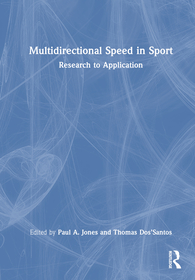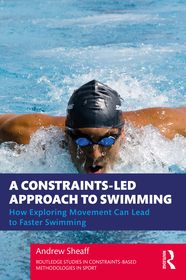
Multidirectional Speed in Sport
Research to Application
-
20% KEDVEZMÉNY?
- A kedvezmény csak az 'Értesítés a kedvenc témákról' hírlevelünk címzettjeinek rendeléseire érvényes.
- Kiadói listaár GBP 38.99
-
18 627 Ft (17 740 Ft + 5% áfa)
Az ár azért becsült, mert a rendelés pillanatában nem lehet pontosan tudni, hogy a beérkezéskor milyen lesz a forint árfolyama az adott termék eredeti devizájához képest. Ha a forint romlana, kissé többet, ha javulna, kissé kevesebbet kell majd fizetnie.
- Kedvezmény(ek) 20% (cc. 3 725 Ft off)
- Kedvezményes ár 14 902 Ft (14 192 Ft + 5% áfa)
Iratkozzon fel most és részesüljön kedvezőbb árainkból!
Feliratkozom
18 627 Ft

Beszerezhetőség
Becsült beszerzési idő: A Prosperónál jelenleg nincsen raktáron, de a kiadónál igen. Beszerzés kb. 3-5 hét..
A Prosperónál jelenleg nincsen raktáron.
Why don't you give exact delivery time?
A beszerzés időigényét az eddigi tapasztalatokra alapozva adjuk meg. Azért becsült, mert a terméket külföldről hozzuk be, így a kiadó kiszolgálásának pillanatnyi gyorsaságától is függ. A megadottnál gyorsabb és lassabb szállítás is elképzelhető, de mindent megteszünk, hogy Ön a lehető leghamarabb jusson hozzá a termékhez.
A termék adatai:
- Kiadás sorszáma 1
- Kiadó Routledge
- Megjelenés dátuma 2023. június 30.
- ISBN 9781032213323
- Kötéstípus Puhakötés
- Terjedelem385 oldal
- Méret 246x174 mm
- Súly 675 g
- Nyelv angol
- Illusztrációk 77 Illustrations, black & white; 25 Halftones, black & white; 52 Line drawings, black & white; 47 Tables, black & white 475
Kategóriák
Rövid leírás:
This book reviews the science of multidirectional speed and translates this information into real-world application to provide a resource for practitioners to develop multidirectional speed with athletes.
TöbbHosszú leírás:
During field- and court-based sports, players are continually required to perceive their environment within a match and select and perform the most appropriate action to achieve their immediate goal within that match instance. This ability is commonly known as agility, considered a vital quality in such sports and may incorporate a variety of locomotion and instantaneous actions.
Multidirectional speed is a global term to describe the competency and capacity to perform such actions: accelerate, decelerate, change direction, and ultimately maintain speed in multiple directions and movements within the context of sports-specific scenarios, encompassing agility, speed, and many other related qualities. Multidirectional speed in sport depends on a multitude of factors, including perceptual-cognitive abilities, physical qualities, and the technical ability to perform the previously mentioned actions.
Multidirectional Speed in Sport: Research to Application reviews the science of multidirectional speed and translates this information into real-world application in order to provide a resource for practitioners to develop multidirectional speed with athletes, bringing together knowledge from a wealth of world-leading researchers and applied practitioners in the area of speed and agility to provide a complete resource to assist practitioners in designing effective multidirectional speed development programmes.
This text is critical reading for undergraduate and graduate sports science students, all individuals involved in training athletes (e.g. coaches, physiotherapists, athletic trainers), and researchers in the field of sports science and sports medicine.
TöbbTartalomjegyzék:
Part 1: Theoretical Basis for Developing Multidirectional Speed. 1. Introduction to Multidirectional Speed. 2. Contextual Importance of Multidirectional Speed in Field- and Court-Based Sports. 3. Biomechanical Basis of Linear and Curvilinear Sprint Performance. 4. Biomechanical and Physical Basis of Change of Direction for Performance and Injury Risk. 5. Deceleration in Sport: Incidence, Demands, and Implications for Training. Part 2: Assessment and Development of Multidirectional Speed. 6. Assessment of Multidirectional Speed Qualities. 7. Assessment of Physical Qualities Associated with Multidirectional Speed. 8. Development of Physical Qualities Related to Multidirectional Speed. 9. Strategies to Develop Linear and Curvilinear Sprinting Technique. 10. Developing Change of Direction and Agility Technique and Movement Solutions. 11. Coaching for Multidirectional Speed: Motor Learning Principles for Developing Sprint and Change-of-Direction Techniques for Performance and Injury Risk Mitigation. 12. Metabolic Conditioning for Multidirectional Speed. 13. Developing Perceptual-Cognitive Factors in Relation to Agility Performance Enhancement. Part 3: Programming for Multidirectional Speed. 14. Programming for Multidirectional Speed in Sport. 15. Monitoring Multidirectional Speed Training. 16. Rehabilitation and Return to Play from Deceleration and Change-of-Direction Specific Injuries. 17. Long-Term Athlete Development for Multidirectional Speed.
Több





